Update December 2023:
Tesla Crash More Than Any Other Brand
The Drive has reported this as “…a lot that goes into making Volvo one of the world’s safest auto brands.”
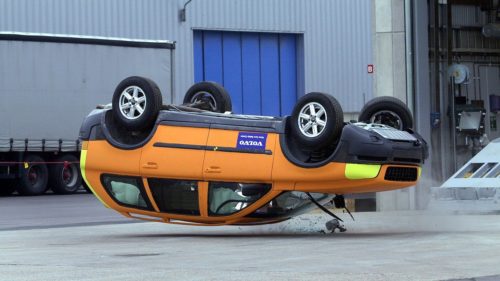
Volvo undeniably puts safety first, above all else. They famously said a long time ago that zero deaths is their vision.
Volvo –- whose XC90 was among the nine vehicles cited by the IIHS [with death rate of zero] –- has set a corporate goal of having no one die in a crash of one of its new products by the 2020 model-year.
It stands out because this brand is superior to Tesla in every way, including innovation (because safety is valued), yet somehow Tesla has pranced around falsely claiming to be better at safety than Volvo. Remember this 2017 circus show?
“The Volvo is arguably the second-safest car in the world,” he said, eliciting laughs and applause from the audience. […] Musk has made such a comparison [with Volvo] in the past, hailing Tesla’s crash safety as the best in the world, a statement that has caught the attention of some industry veterans because Volvos have a longstanding reputation for safety. The company even has a plan to eliminate crash deaths in its new cars by 2020.
Perhaps this “safest cars in America” analysis a year earlier in 2016 says it best.
Volvo actually made this claim way back in 2008, as part of their Vision 2020 initiative; good on them for sticking to it. The initiative appears to be back in the news now because with autonomous cars a sure thing, their claim sounds less like optimism and more like certain truth. Volvo has announced, after all, that they’ll be selling autonomous cars in just four years’ time. “With the development of full autonomy we are going to push the limits of automotive safety,” Volvo safety engineer Erik Coelingh told CNN Money, “because if you make a fully autonomous vehicle you have to think through everything that potentially can happen with a car.”
Certain truth? Turns out to be the exact opposite, a hard won engineering problem. Volvo backed away from full autonomy and warned people to remain in control, while sticking to their zero deaths goal.
“We’re trending towards zero,” said Mr Rourke. “It’s a vision…that’s what we’re aiming towards.” When asked why Volvo had watered down its initial mission statement about zero deaths, Mr Rourke said: “We’re not taking a step back on anything. We’ve said this is our vision (that)…nobody will be hurt or seriously injured or killed in a brand-new Volvo in 2020. Our vision is to make it next to near impossible (to die in a new Volvo).”
Volvo’s driver assistance technology today is arguably the best, not least of all because you never hear about it in the news. It’s no lie, it just does what they say it does.
And on top of reiteration of that vision, they immediately have responded to any defect with deep analysis and course correction (far better than Tesla, which is slow to respond if at all).
Let me give a few clear examples.
Many manufacturers track ZERO deaths right now in popular models, despite high volume sales, achieving some of the safest records in history.
Let me say that again so it’s clear: selling more cars DOES NOT cause death rates from those cars to go up. Some cars (e.g. Chevy Bolt, Nissan LEAF) become top sellers without any deaths. Over a half-million LEAFs had been sold worldwide by 2020, the first in history to achieve such high electric vehicle sales numbers. On top of sales leadership and growth worldwide, the LEAF was incredibly safe and had almost no fatalities at all.
…the small electric Leaf car, the midsized Pathfinder SUV, and the midsized luxury QX60 SUV–are equally capable of keeping their drivers alive… if 1 million drivers drove 1 million of the aforementioned Leafs for a full year in the US, we would expect 5 of them to die over the course of the year. This is really, really good.
Tesla on the other hand, showing up as a relative newcomer without having to maintain any legacy of old technology or methods, has since 2013 earned a horrible and tragic reputation for boastful (lying) about safety while accumulating hundreds of unnecessary deaths.
The CEO of Tesla has tried to excite his audiences by claiming magically his cars will be better than Volvo, promising his customers a false sense of being the best at safety.
Basic data shows instead he has failed miserably:
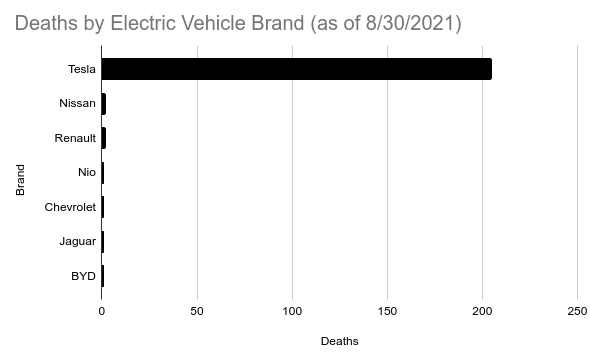
When I post this chart I often hear Tesla believers complain it doesn’t conform to their bias because it obscures sales volumes.
Does it?
In fact, sales volumes would make this chart worse because Tesla sold fewer cars while killing more.
First, volume shouldn’t cause more deaths (remember especially Tesla promised more cars means more data, which would reduce their fatalities, an obvious lie).
Second, Tesla doesn’t have higher volume of sales. Nissan? Chevrolet? Jaguar? These manufacturers are far older and have far more cars on the road than Tesla. Nissan outsold Tesla in EV, and still dominates EV markets like Norway. This begs the question of why brands usually improve safety yet Tesla gets worse and worse.
And who was putting electric cars on the road in 1948? Nissan.
Far more cars on the road, and far more years of electric cars on the road, yet Nissan fatalities are dramatically lower. Their LEAF reigned as the all-time top selling plug-in electric car through December 2019. While Nissan quickly approaches 600,000 “autopilot” vehicles on the road (with over 20 years of development by 2017 they reasonably named it “pilot assist”) there have been ZERO crashes to report.
ZERO crashes to report. 600,000 cars.
Indeed the chart reflects that Tesla alone runs an unnecessary and blatant disregard for safety engineering compared to all the other car manufacturers.
The safety laggard stands out because being careless liars reveals them as an obvious fraud.
Look at the following table showing this year of high sales volumes for electric cars next to total deaths by model:
| Car | 2021 Sales So Far | Total Deaths |
| Tesla Model S | 5,155 | 40 |
| Porsche Taycan | 5,367 | ZERO |
| Tesla Model X | 6,206 | 14 |
| Volkswagen ID | 6,230 | ZERO |
| Audi e-tron | 6,884 | ZERO |
| Nissan Leaf | 7,729 | 2 |
| Ford Mustang Mach-e | 12,975 | ZERO |
| Chevrolet Bolt | 20,288 | 1 |
| Tesla Model 3 | 51,510 | 87 |
Tesla deaths clearly stand out like a sore thumb.
The Porsche Taycan reports ZERO fatalities while it is expected to outsell Tesla’s comparable model. I’m kind of surprised nobody talked about the Model S having 24 deaths in just two years (2018-2019) as a signal to stop production. Ford said their Pinto had only 23 deaths when the world erupted in condemnation for unsafe design.
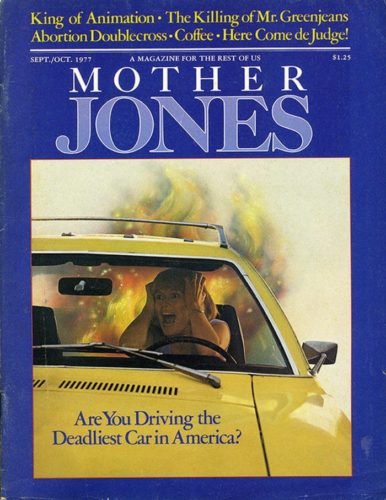
Remember, the high-death toll of Model S came right as the CEO of Tesla angrily spun disinformation like barking Tweets at the WSJ: “Tesla safest car on road”.
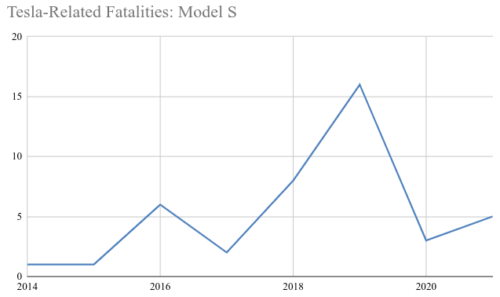
You won’t find many better examples of such dangerous disinformation, or an obvious willful intent of a CEO to deceive customers and manipulate markets.
I mean if increasing volume of sales alone were some kind of weird excuse for these high death tolls, or increasing miles driven for that matter, then we should expect the Chevrolet Bolt (141,000 sold in the US from 2017 to 2021) to have FAR more deaths than just one!
Just to refresh everyone’s memory, the Chevy Bolt was the second-best-selling electric vehicle in 2017, was the 2017 Motor Trend Car of the Year, the 2017 North American Car of the Year, the 2017 All Star in Automobile magazine, and one of Time magazine’s 2016 Top 25 Inventions. What is it about this top-selling Chevy that makes it dramatically safer than any Tesla while soaking up all the awards and being infinitely more modest?
Tesla’s boastful safety PR claims make no sense because they are liars.
Consider also how the Chevy Bolt predecessor (small 4-door car called a Volt) since 2010 sold 157K cars and recorded an average of 0.7 deaths per year. LESS THAN ONE.
Now look again at how the comparable Tesla Model 3 runs an average of 30 deaths PER YEAR.
I’ll say it again: while Nissan delivered its “pilot assist” software (direct competition to Tesla FSD) into nearly 600,000 vehicles, including the best all-time selling EV in Norway (LEAF) it has reported ZERO crashes.
Volume of cars? Sorry, no.
Tesla since it first hit the road has been sending many people to early graves, and instead of improving seems also to be on track to digging an ever larger graveyard.
The basic predictive model looks absolutely horrible.
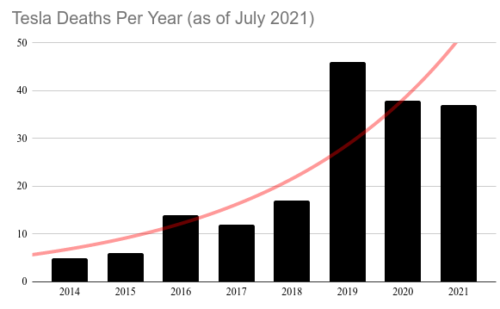
Here’s a qualitative sample of the problem:
Model 3, capable of hitting 60 mph in 2.9 seconds… left the Tesla heading straight into oncoming traffic, as indicated in this photo taken from the Tesla Model 3 seconds before the crash. With the Model 3 hitting nearly 50 mph and still accelerating, the plaintiff was able to avoid the oncoming traffic, an Amish buggy and utility poles before slamming into the building [seriously injuring a woman at her desk who died two weeks later].”
A smaller, lighter, less boastful vehicle from Chevrolet has a safety record far superior than an expensive exotic luxury model from a CEO claiming to have beat Volvo in safety vision. It doesn’t make any sense.
Who looks at a tiny, inexpensive Chevrolet Bolt and thinks this thing is the top safety choice, way better than Tesla’s falsely advertised ones?
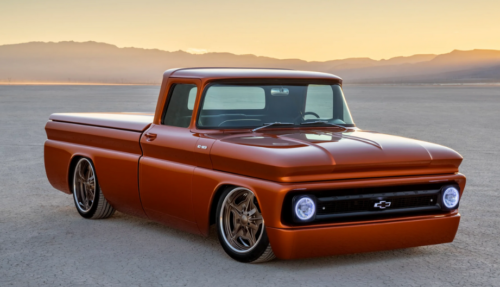
The very public news about car safety certainly suggests people should look at the Bolt as a safety leader, since it issued a total recall for a serious defect even when it hasn’t yet killed anyone.
The latest news is just three injuries prompted the Bolt manufacturer to recall ALL of them.
Nearly a month ago General Motors announced it’s recalling every single Chevy Bolt ever made due to a potential fire risk. A defect within the battery system has so far caused 12 fires out of 147,000 Bolts produced and 3 injuries. For many brands and models, this would be a death blow.
Just three injuries. Total recall.
Speaking of fires, Tesla data shows at least 20 fatalities related to fire, and many more injuries. (Update January 2023: now 53 fatalities, double the Ford Pinto).
…”if Tesla were an average car, we would have expected 0.23 Tesla fire deaths in 2016, 0.35 in 2017, 0.45 deaths in 2018, and 0.16 deaths in 1Q 2019,” [a financial analyst] wrote. That’s a total of 1.19 fire deaths over three years. Business Insider has counted at least 20 reported incidents of Teslas catching on fire since 2013 and five deaths in the past 14 months.
I’m not a lawyer yet as a security professional these technology failures of Tesla indicate reckless management with a disregard for life that rises to the level of culpable negligence.
Have Tesla’s high rate of deaths from fires been a “death blow” to the brand or model?
The answer is sadly no. Look back at 2016 when a test drive erupted in fire and the Tesla response was… safety is “unclear” to them and they aren’t going to investigate further.
Tesla spokesman in France said that “the fire was caused by a bolted electrical connection that had been improperly tightened.” He added that the electrical connections are normally installed by a robot, but in that particular car, the connection was installed manually. It’s unclear why the connection wasn’t done by a robot like it typically is, but the spokesman did say that there has never been a similar incident in another car.
See any difference in quality control and safety?
Tesla literally ran with “we don’t understand” and “we can’t extrapolate” to pin their brand to ignoring any potentially serious defect.
Fast forward to 2021 and a Tesla spontaneously erupts into fire again after the company said it delayed a release for months to ensure safety.
Tesla had originally boasted with their first few thousand cars they would be the safest on the road, safer than a Volvo, and they said the more of their cars on the road would only make things even safer.
Yet only a few years later the exact opposite has happened. As the charts here have shown, the more Tesla produced, the more deaths — and it’s trivial to understand why.
Look at the Volvo team for comparison to how things should be done, and why Tesla tried to treat them as a target.
In 2014 Volvo announced automation technology to help drivers be safer by monitoring alertness.
It was low fanfare, simple in design and made sure drivers understood it was an augmentation related to drivers being in control and safe.
By 2017 Volvo was scaling back its announcements, bringing out a four-year delay, with warnings like this one:
…we are finding that there were more issues to dig into and solve than we expected…
Completely the opposite to Tesla’s CEO in 2019 literally telling people “full self-driving” already was reality that year so drivers should feel comfortable going to sleep in their cars.
Tesla boss Elon Musk says “full self-driving” cars will hit the road this year, with drivers able to sleep in their vehicles in 2020. “My guess as to when we would think it is safe for somebody to essentially fall asleep and wake up at their destination? Probably towards the end of next year,” he said. “I think we will be feature complete, full self-driving, this year — meaning the car will be able to find you in a parking lot, pick you up, and take you all the way to your destination without an intervention — this year. “I would say I am of certain of that. That is not a question mark.”
A complete lie. Absolutely not true.
Here we are in 2021 and Tesla’s “full self-driving” continues to fail in widely documented safety disasters!
That is not a question mark.
The latest version of Tesla, despite all the miles, are veering into the wrong lanes at pedestrians and oncoming traffic, barely functioning despite being promoted as “version 10“.
Tesla deaths can only be expected to continue to rise from a combination of this kind of poor engineering with fraudulent promotional bombast.
Now back to Volvo.
A fault in their airbag design has caused a single fatality so they have quickly issued a complete recall of ALL vehicles affected.
The recall includes about 259,383 vehicles in the U.S., 7,048 in Canada and 2,475 in Mexico. The affected vehicles are the S80 sedan from the 2001 to 2006 model years and the S60 sedan from the 2001 to 2009 model years, according to a document posted to NHTSA’s website.
If that number of vehicles seems high, that’s because Volvo sells a lot of cars. And while Volvo states a clear commitment to reaching zero deaths and shows very obvious actions to achieving that laudable goal, Tesla seems only to come up with lies and excuses for why it has keeps failing — killing more and more people.
Update January 2023:
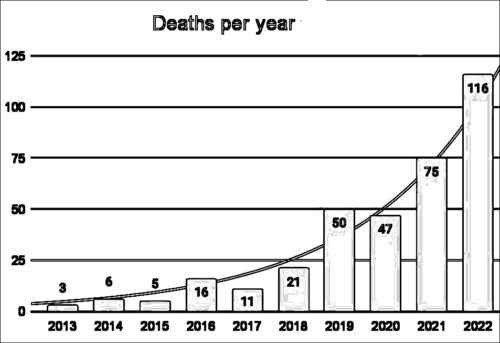
Before reading this article, I had somewhat positive thoughts about Tesla. I am fairly familiar with the car industry and typically look at the performance of cars rather than safety. When I think of Tesla, I think of their fast-accelerating, minimalistic design, like a souped 1990s Kia. Every now and then I remember hearing about how someone was dumb enough to completely trust the autopilot in their car and it failed and killed some people. However, I never thought about this in context. I never compared it to the safety of other electric vehicles. This article, however, explores that context and how Tesla is not up to the industry standards. In fact, their lack of concern may be considered neglectful.
I don’t want to be like those dumb people who completely trust things and can’t figure them out, so I appreciate this post giving me the data and tools to better understand how bad Tesla failures are for the public. Crime is public crime.
For example I understand now better what the writer means by the term “death”. Following the sources and citations I found that Elon Musk wants every death reported and recorded. When he boasted in 2016 that his cars would become the safest on the road he included the definition, safer for anyone inside or outside the car: “Wrong to exclude non-occupant deaths!” Why wouldn’t we then expect everyone to report any/every death as a failure?
Next I understand better how Tesla kills more people with more cars, yet other brands see their averages improve as sales go up. Chevy and Nissan were delivering hundreds of thousands of cars without any death at all. At the same time, every new Tesla on the road was statistically likely to cause another death. How many electric vehicles does each brand have on the road? If Tesla has 200 more times the number of vehicles on the road, then their deaths will climb as everyone else stays flat (as they should, even one death is too many no matter how many cars are sold).
On that point the sales table is very powerful. If the “deaths” column is total deaths in that given model of new car, then why is that car still being sold in 2021? As the author hints, in just a few years the car has extremely high death rates that are increasing, suggesting serious design defects. Chevy Bolt having even chance of fire meant total fleet recall and their complaints are at zero, deaths extremely low. Tesla clocks in hundreds of deaths very quickly, which we don’t see in the other brands at all. Porsche outsells Tesla at the high performance end and yet has zero deaths. If they had hundreds of deaths would they even continue to sell?
The last graph is very eye opening. It’s just a graph of the number of deaths related to Tesla by year with a predictive trendline. Tesla sells more cars every year and statistically due to their lack of safety, there will be more deaths every year if the probability remains the same. That alone is the argument to ban the car. The writer has powerfully made the point that Tesla is doing nothing to decrease the probability. And has driven that point home by showing how other brands work harder and smarter to make driving safer.
Nearly ten years ago i took a serious look at Tesla and saw a corporate picture of a leader with too many irons in the fire. I prefere brands that do fewer things but do them extremely well. I do technical work in an ISO factory and refuse to purchase goods made poorly by someone who talks too much. Let Musk see if he can ever match Volvo on quality and safety, i’ll be watching.